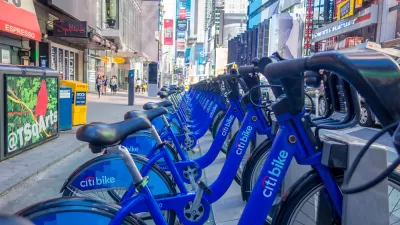Transit ridership is dropping, but a closer look at causes points to the role bike share could play in making transit a better option.

Alissa Walker reviews recent research about the causes of declining transit ridership in cities across the country. An analysis by researchers at the University of Kentucky shows that the introduction of bike share results in increases in rail ridership but decreases in bus ridership. In addition, ride-hailing operations in cities appear to lead to ridership decreases on both modes over time.
But shared mobility’s influence on transit ridership is not entirely clear cut. A new TransitCenter report says that ride-hailing services are drawing people away from transit, but riders are not completely abandoning transit. Instead, many are scaling back and replacing some transit trips with car trips.
These findings, along with Uber’s announcement that more people in Sacramento made trips on electric Jump bikes than in Uber vehicles in October 2018, indicate that bike share might play an important role in making transit a more viable option for travelers, particularly in places where shorter trips are the norm, says Walker.
"Providing better bus service should absolutely be an important priority for cities to improve transit ridership. But cities shouldn’t ignore the power of providing ubiquitous bikes and safer infrastructure to help capture transit-savvy riders as they’re making decisions about their next move," concludes Walker.
FULL STORY: How can cities boost transit ridership? Add more bike share

Planetizen Federal Action Tracker
A weekly monitor of how Trump’s orders and actions are impacting planners and planning in America.

San Francisco's School District Spent $105M To Build Affordable Housing for Teachers — And That's Just the Beginning
SFUSD joins a growing list of school districts using their land holdings to address housing affordability challenges faced by their own employees.

The Tiny, Adorable $7,000 Car Turning Japan Onto EVs
The single seat Mibot charges from a regular plug as quickly as an iPad, and is about half the price of an average EV.

Seattle's Plan for Adopting Driverless Cars
Equity, safety, accessibility and affordability are front of mind as the city prepares for robotaxis and other autonomous vehicles.

As Trump Phases Out FEMA, Is It Time to Flee the Floodplains?
With less federal funding available for disaster relief efforts, the need to relocate at-risk communities is more urgent than ever.

With Protected Lanes, 460% More People Commute by Bike
For those needing more ammo, more data proving what we already knew is here.
Urban Design for Planners 1: Software Tools
This six-course series explores essential urban design concepts using open source software and equips planners with the tools they need to participate fully in the urban design process.
Planning for Universal Design
Learn the tools for implementing Universal Design in planning regulations.
Smith Gee Studio
City of Charlotte
City of Camden Redevelopment Agency
City of Astoria
Transportation Research & Education Center (TREC) at Portland State University
US High Speed Rail Association
City of Camden Redevelopment Agency
Municipality of Princeton (NJ)





























